|
|
|
Sort Order |
|
|
|
Items / Page
|
|
|
|
|
|
|
| Srl | Item |
| 1 |
ID:
105948
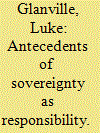

|
|
|
|
|
| Publication |
2011.
|
| Summary/Abstract |
Notions of 'sovereignty as responsibility' and 'the responsibility to protect' are often fra-med as radical departures from the 'traditional' conception of sovereignty. Many assume that sovereignty has, until recently, entailed only rights and not responsibilities. In con-trast, this article argues that sovereign authority has been understood to involve varied and evolving responsibilities since it was first articulated in the 16th and 17th centuries. It then traces the historical emergence of the tension between the right of sovereign states to be self-governing and free from outside interference and their responsibility to secure the safety of their populations. It cautions against a simplified story of 'traditional' sovereignty which reifies supposedly concrete and ahistorical rights of sovereigns while casting sovereign responsibilities as a morally abstract and late-arriving challenge.
|
|
|
|
|
|
|
|
|
|
|
|
|
|
|
|
| 2 |
ID:
105951
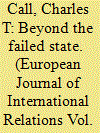

|
|
|
|
|
| Publication |
2011.
|
| Summary/Abstract |
The article advances conceptual alternatives to the 'failed state.' It provides reasons why the concept is deficient, showing especially how counterproductive it is to aggregate states as diverse as Colombia, Malawi, Somalia, Iraq, Haiti, and Tajikistan. I argue for distinguishing among capacity gaps, security gaps, and legitimacy gaps that states experience. Importantly, I show that these gaps often do not coincide in a given country, and that the logical responses to each of the three gaps diverge in significant ways. I offer brief case examples of the logic of response to the gaps and of the tensions that must be managed among them. The article advances the debate over an important and under-theorized emergent concept in global politics.
|
|
|
|
|
|
|
|
|
|
|
|
|
|
|
|
| 3 |
ID:
105947
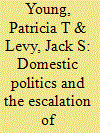

|
|
|
|
|
| Publication |
2011.
|
| Summary/Abstract |
The study of international rivalry is a thriving research program in international relations, but it focuses primarily on strategic rivalries and generally neglects both commercial rivalries and the impact of domestic politics. We examine commercial rivalry and the causal paths through which it can escalate to war. After identifying alternative theoretical explanations, we focus on the Anglo-Spanish rivalry of the 1730s and the processes through which it escalated to the War of Jenkins' Ear (1739-48). We examine both balance of power and dyadic trade rivalry explanations, and then give special attention to domestic politics in Britain. We argue that the commercial rivalry was a necessary but not sufficient condition for the war of 1739. The Walpole ministry was opposed to war, and the rivalry would not have escalated in the absence of domestic pressures from mercantile interests, a xenophobic public, a politically opportunistic parliamentary opposition, and a divided cabinet.
|
|
|
|
|
|
|
|
|
|
|
|
|
|
|
|
| 4 |
ID:
105949
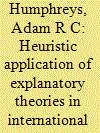

|
|
|
|
|
| Publication |
2011.
|
| Summary/Abstract |
Explanatory theorists increasingly insist that their theories are useful even though they cannot be deductively applied. But if so, then how do such theories contribute to our understanding of international relations? I argue that explanatory theories are typically heuristically applied: theorists' accounts of specific empirical episodes are shaped by their theories' thematic content, but are not inferred from putative causal generalizations or covering laws. These accounts therefore gain no weight from their purely rhetorical association with theories' quasi-deductive arguments: they must be judged on the plausibility of their empirical claims. Moreover, the quasi-deductive form in which explanatory theories are typically presented obscures their actual explanatory role, which is to indicate what sort of explanation may be required, to provide conceptual categories, and to suggest an empirical focus. This account of how theoretical explanations are constructed subverts the nomothetic-idiographic distinction that is often used to distinguish International Relations from History.
|
|
|
|
|
|
|
|
|
|
|
|
|
|
|
|
| 5 |
ID:
105953
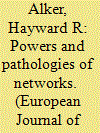

|
|
|
|
|
| Publication |
2011.
|
| Summary/Abstract |
This article reconstructs Karl Deutsch's fearful yet hopeful views about the powers and
pathologies of military, and other, national and international network systems. These
views presuppose Norbert Wiener's Cybernetic Interpretive Hypothesis: that 'society
can only be understood through a study of the messages and communication facilities
which belong to it'; that the societal trend is towards more computerized communication
systems; and that they embody an 'open vs. closed' living systems ethos. Drawing on
science and technology studies by Edwards and Mirowski, the author suggests how
Deutsch's and Wiener's prophetic hopes, fears, and insights can also enrich and redefine
contemporary debates about the historical-technological development of our national
societies, the powers and pathologies of game-theoretically programmed computer
networks, the assessment of the life-preserving potential of our partly automated
security systems, the major threats from the continued poverty of the less developed
world, problems of decentralized governance, and the political, ethical, and religious
justifications for our national, international, and civilizational identities and purposes.
|
|
|
|
|
|
|
|
|
|
|
|
|
|
|
|
| 6 |
ID:
105950
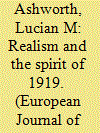

|
|
|
|
|
| Publication |
2011.
|
| Summary/Abstract |
Recent analyses of interwar International Relations (IR) have argued that there was no realist-idealist debate, and that there is no evidence of a distinct idealist paradigm. Less work has been done on realism in the interwar period. This article analyses the thought of one particular early 20th-century realist: Halford J. Mackinder. A product of the development of political geography, and a major influence on American strategic studies, Mackinder is best known for his Heartland thesis, which has been interpreted as environmental determinism. Yet, Mackinder's realism is a complex mix of geopolitical analysis and the influence of ideas on human action. His concepts of organizer and idealist foreign policy ideal types pre-date Carr's realist-utopian distinction by two decades, while his interpretation of the realities of international politics is at odds with Morgenthau's realism. A closer analysis of Mackinder's realism (1) underscores the links between geopolitics and realist strategic studies; (2) demonstrates the diversity of realist approaches in interwar IR; and (3) shows that it was possible to be a realist and also support the League of Nations. There are limits to Mackinder's usefulness to 21st-century IR, but an understanding of his brand of realism is necessary for a fuller understanding of the development of realism as a 20th-century school of thought.
|
|
|
|
|
|
|
|
|
|
|
|
|
|
|
|
| 7 |
ID:
105945


|
|
|
|
|
| Publication |
2011.
|
| Summary/Abstract |
Most theories of empire and international hierarchy have implicitly or explicitly posited disparities of power between the core and the periphery as a sufficient condition for the stability of imperial arrangements. While power is a necessary condition, it is not sufficient. Peripheral actors can resist despite power disparities, and such resistance can destabilize imperial institutions. Given this fact, the preferences and beliefs that motivate peripheral actors to seek either accommodation or to resist are of central importance for explaining empire and hierarchy. These preferences can be explained by analyzingthe complementarities between the imperial order and domestic political institutions in the periphery. This will be demonstrated through comparison of European informal empire in China, the Ottoman Empire and Egypt.
|
|
|
|
|
|
|
|
|
|
|
|
|
|
|
|
| 8 |
ID:
105946
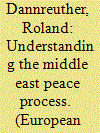

|
|
|
|
|
| Publication |
2011.
|
| Summary/Abstract |
This article challenges the common assumption that the external actors involved in the Middle East Peace Process (MEPP) are driven either by neo-realist strategic competition or by the constraining power of domestic lobbies, or by a mixture of both. Such implicit assumptions are evident in the controversial argument of the power of the 'Israel lobby' as promoted by John Mearsheimer and Stephen Walt. This article argues that approaches based on such assumptions fail to explain adequately the policies adopted not only by the United States, but also by other key external actors who have been historically engaged in the MEPP - the Soviet Union and the European Union. A better explanatory framework is provided by treating the MEPP as an institution and by applying a historical institutionalist approach to the development of the MEPP, using such concepts as critical junctures, path dependence and positive feedback to analyse how the main external actors involved in the MEPP came to adopt their distinctive national approaches to the peace process. In particular, it is the responses of these actors to certain critical junctures, most notably but not exclusively to the period of the 1967 and 1973 Arab-Israeli wars, that has had a particularly strong influence on policy formulation. For the US case, the creative policymaking of Henry Kissinger during the period after the 1973 war, which was subsequently incorporated into the US conceptualization of the MEPP, provides powerful and generally unrecognized insights into the initial puzzle identified by Walt and Mearsheimer - the consistent and almost unconditional support given to Israel by the United States despite the strategic problems this creates for broader US Middle East policy.
|
|
|
|
|
|
|
|
|
|
|
|
|
|
|
|
| 9 |
ID:
105952


|
|
|
|
|
| Publication |
2011.
|
| Summary/Abstract |
This article aims to show the theoretical added value of focussing on discourse to study identity in international relations (IR). I argue that the discourse approach offers a more theoretically parsimonious and empirically grounded way of studying identity than approaches developed in the wake of both constructivism and the broader 'psychological turn'. My starting point is a critique of the discipline's understanding of the 'self' uncritically borrowed from psychology. Jacques Lacan's 'speaking subject' offers instead a non-essentialist basis for theorizing about identity that has been largely overlooked. To tailor these insights to concerns specific to the discipline I then flesh out the distinction between subject-positions and subjectivities. This crucial distinction is what enables the discourse approach to travel the different levels of analyses, from the individual to the state, in a way that steers clear of the field's fallacy of composition, which has been perpetuated by the assumption that what applies to individuals applies to states as well. Discourse thus offers a way of studying state identities without presuming that the state has a self. I illustrate this empirically with regards to the international politics of whaling.
|
|
|
|
|
|
|
|
|
|
|
|
|
|
|
|
|
|
|
|
|